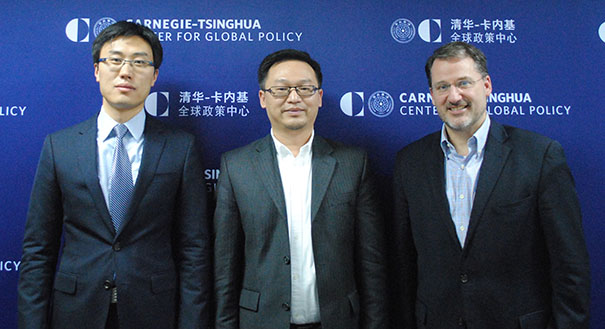Registration
You will receive an email confirming your registration.
Even before his inauguration, President-elect Trump signaled his intention to upend U.S. foreign policy conventions once in office, including in the Asia-Pacific region. His phone call with Tsai Ing-wen called into question whether he intends to adhere to the “One China” policy, which many believe has served as a foundation of regional stability for decades. Trump’s comments on China since then have raised concerns about the potential for increased friction across the Strait and between the United States and China. At the same time, cooperation with China remains important if Trump is to address the North Korea nuclear issue and other common challenges. How will the new administration approach its China policy, and what will it mean for regional stability?
To shed light on the future of bilateral relations and the implications for the Asia-Pacific region, Carnegie–Tsinghua Center Fellow Tong Zhao moderated a discussion with Chen Dingding from Jinan University, who predicted the outcome of the U.S. presidential election months earlier. Carnegie–Tsinghua Center Director Paul Haenle provided insights into the opportunities and constraints facing the next administration as it shapes its China policy.
This event was off the record.
Discussion Highlights
- Global Trends and Challenges: Panelists said they expect 2017 will bring both a host of challenges to stability in the Asia-Pacific region and opportunities to preserve it. One panelist said that global challenges will be primarily embodied by the current wave of populism sweeping across many parts of Europe and the United States. Another panelist contended that the world is experiencing its greatest transformation since the end of World War II. In spite of these challenges, the panelists maintained that shared global interests such as climate change, trade, and nuclear non-proliferation represent an opportunity to preserve global, as well as regional, stability.
- Domestic Disturbances: The panelists agreed that these global challenges will likely originate from domestic politics in both the United States and China. Panelists expect that intranational tensions and domestic divides will continue to influence domestic politics in the Unites States post-election. One panelist pointed out that domestic concerns will take precedence over international issues given widespread domestic uncertainty. A discussant argued out that while president-elect Donald Trump’s pick for secretary of state, Rex Tillerson, is unconventional, the businessman has significant international experience and could prove to be an effective figure in shaping U.S. policy toward Asia while also maintaining regional stability.
- The Limits of Leadership: This year, panelists said, will be trying for both American and Chinese political leaders. While Xi Jinping and the Chinese leadership will focus on China’s quinquennial leadership reshuffle, president-elect Trump will consolidate his own administration. Trump’s relative lack of policy experience and China’s upcoming 19th Party Congress mean that the world’s two most powerful countries will be simultaneously going through highly sensitive political transitions, commented one panelist. As a result, discussants argued that internal leadership dynamics will command the attention of both Americans and Chinese, which may reduce the likelihood of open conflict. However, they said that frictions remain a distinct possibility.
- Campaign Rhetoric: One panelist argued that Trump’s rhetoric throughout the 2016 presidential election and its policy applications will be another influential factor in shaping U.S. policy and, by extent, regional stability in Asia. While campaigning, Trump focused on the negative aspects of globalization for the average citizen and named immigrants, bad trade deals, and the elite as the culprits behind many of the United States’ current problems. Panelists expect these ideas will continue to be invoked during a Trump presidency, which they said could have potentially negative consequences for stability in Asia. One discussant said Trump’s calls to renegotiate bad trade deals made under previous administrations is one example of how the president-elect’s electoral narrative could be formulated into policy.
- The Trump Playbook: Panelists anticipate that certain aspects of Trump’s policy views will transform U.S. policy toward Asia. A discussant argued that the ease with which Trump has gone after many of the sacred cows of international politics, such as alliances and trade deals, will likely increase regional instability—especially in light of the fundamental importance of these commitments in Asia. Likewise, Trump’s use of social media could significantly alter traditional diplomacy and force it onto a much more open and confrontational track, according to one panelist.
Tong Zhao
Tong Zhao is a fellow in Carnegie’s Nuclear Policy Program based at the Carnegie–Tsinghua Center for Global Policy.
Chen Dingding
Chen Dingding is a professor of international relations at Jinan University and a nonresident fellow at the Global Public Policy Institute in Berlin, Germany.
Paul Haenle
Paul Haenle is the director of the Carnegie–Tsinghua Center for Global Policy based at Tsinghua University in Beijing. Haenle’s research focuses on Chinese foreign policy and U.S.-China relations.
